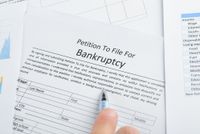
Discharging debt by declaring bankruptcy can be a godsend for those who find themselves in over their heads financially. To prevent people from taking advantage of the system, though, there are certain requirements that filers must meet. Since Chapter 7 does not require any kind of payment plan, for example, it is reserved for those with little to no discretionary income. If you’re thinking about declaring Chapter 7, here is what you should know about qualifying.
Income Requirements
Individuals who want to file Chapter 7 must earn less than their state’s median income for a household of their size. If they earn more, however, they may still qualify as long as they can pass a means test. To complete this test, you must total your monthly income and then subtract applicable expenses to determine how much will be left over to pay back creditors.
 If your total disposable income amounts to less than $7,475 for the next 60 months, you qualify. If it is between $7,475 and $12,475, additional calculations are necessary to determine eligibility. If it’s more than $12,475, you cannot file Chapter 7.
If your total disposable income amounts to less than $7,475 for the next 60 months, you qualify. If it is between $7,475 and $12,475, additional calculations are necessary to determine eligibility. If it’s more than $12,475, you cannot file Chapter 7.
Filing History
The government limits how often debtors can petition for bankruptcy. If you discharged debt through Chapter 7 within the past eight years or through Chapter 13 within the past six years, you are ineligible to declare Chapter 7 again. You are also ineligible to file if you petitioned for either kind of bankruptcy within the past 180 days and the case was dismissed.
If you’re wondering whether you qualify for Chapter 7, turn to an attorney at Bueker Law Firm in Stuttgart, AR. Since they focus solely on bankruptcy and other financial issues, they are always up-to-date on the proceedings, precedents, and regulations that might affect clients. When your financial security is at stake, it’s this kind of comprehensive counsel that will help you get back on track. Visit their website or call (870) 673-1313 to schedule a free consultation with a bankruptcy lawyer today.
About the Business
Have a question? Ask the experts!
Send your question

